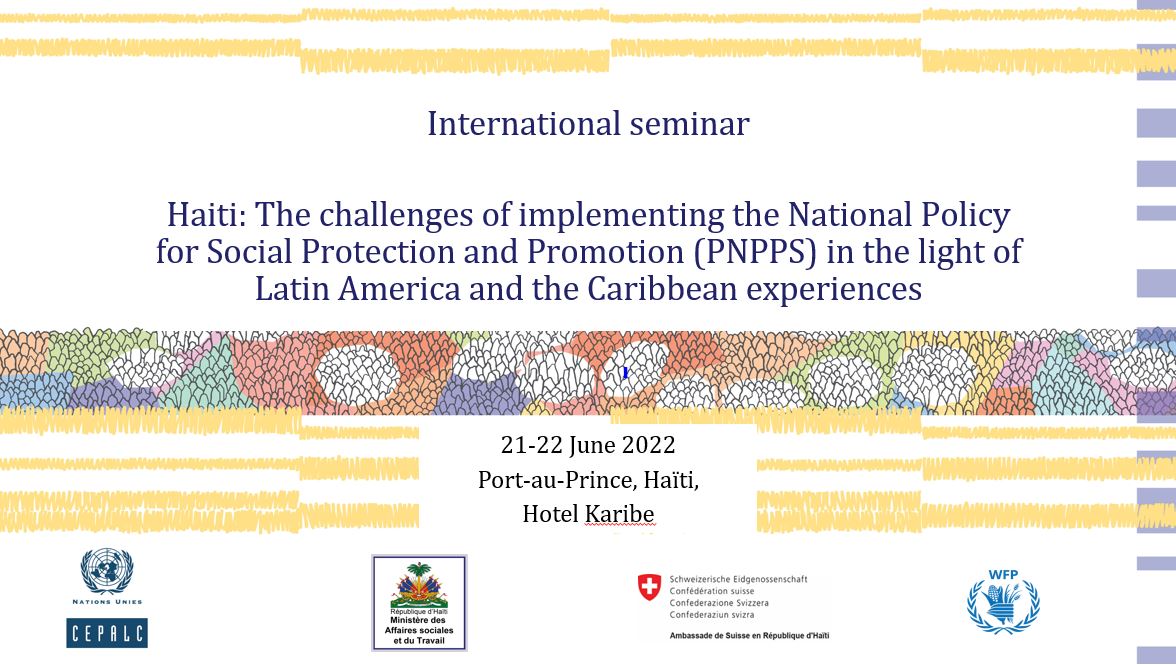ECLAC Supports Haiti in the Process of Implementing its National Social Protection Policy
Work area(s)
On June 21-22, an international seminar took place in Port-au-Prince with the aim of addressing the Caribbean country’s implementation of the National Policy for Social Protection and Promotion.

“We at ECLAC continue to be available to support Haiti in forging a social protection system with a State vision and with a rights-based perspective placing equality at the center,” Alberto Arenas de Mesa, Director of the Social Development Division of the Economic Commission for Latin America and the Caribbean (ECLAC), stated during an international seminar entitled Haiti: The challenges of implementing the National Policy for Social Protection and Promotion (PNPPS), held on June 21-22, 2022 in Port-au-Prince using a hybrid format (in person and virtual).
The event was organized by ECLAC, the Ministry of Social Affairs and Labor (MAST) of Haiti, the Haiti office of the World Food Programme (WFP) and the Embassy of Switzerland in Haiti, in the framework of the technical assistance and cooperation activities that the Commission has carried out with the Ministry (since 2015) and with the WFP’s country office (since 2019), which culminated in the promulgation of the National Policy for Social Protection and Promotion in July 2020.
The promulgation of the PNPPS is considered to be a major political and institutional advance, since this instrument defines the strategic framework for the interventions needed to sustainably address priority tasks such as the eradication of poverty, the reduction of inequalities, and the promotion of all Haitians’ autonomy and rights.
ECLAC and the other institutions are now focused on supporting this policy’s effective implementation, in particular the drafting of action plans at a national and departmental level.
The international seminar featured opening remarks by Pierre Ricot Odney, Minister of Social Affairs and Labor of Haiti; Marc-André Prost, Deputy Director of the World Food Programme’s Haiti office; Fabrizio Poretti of the Swiss Embassy; and Alberto Arenas de Mesa from ECLAC. Also participating in the event were officials from the MAST and other Haitian entities; governmental representatives from Chile, Colombia, Costa Rica, the Dominican Republic, Jamaica, Mexico, Peru and Uruguay; specialists from ECLAC and the WFP; and members of civil society and academia.
In his remarks, Minister Pierre Ricot Odney said he was convinced that the seminar would contribute to identifying and very clearly addressing the distinct challenges related to implementation of the PNPPS, in order to achieve a coherent and effective social protection system. “On behalf of the Government, and the MAST in particular, I want to express gratitude for the efforts made by the World Food Programme and ECLAC, along with other United Nations agencies, which have supported us throughout this journey,” he emphasized.
Meanwhile, Marc-André Prost, of the WFP, reiterated his institution’s commitment to the Haitian Government with regard to strengthening institutional capacities in terms of social protection and promotion and supporting the development of information systems to guide implementation of the PNPPS. “The World Food Programme sees a strong link between its ‘zero hunger’ mandate for 2030 and social protection. In fact, our overall strategy includes ‘increasing access to national social protection systems that safeguard and foster people’s ability to meet their food security and nutrition needs,’” he explained.
Fabrizio Poretti, from the Swiss Embassy, warned that “Haiti’s sociopolitical and economic reality shows, today more than ever, the importance of strengthening initiatives and joint efforts to fight against extreme vulnerability, reducing inequalities and promoting access to basic social services” in the country.
The international seminar held in Haiti is directly connected to the work of the Regional Conference on Social Development in Latin America and the Caribbean, a subsidiary body of ECLAC. In the context of this Conference, in 2019, senior authorities from the region approved the Regional Agenda for Inclusive Social Development, a technical-political instrument that seeks to support implementation of the social dimension of the 2030 Agenda and that includes as one of its four axes, “regional cooperation and integration, to progress towards inclusive social development and achieve sustainable development.”
“Latin America and the Caribbean,” said the Director of ECLAC’s Social Development Division, “is a diverse region that shares numerous challenges, with high vulnerability to poverty and inequality and gaps in access and participation that especially affect certain populations.”
The event in Port-au-Prince precisely sought to bolster partnerships between the Ministry of Social Affairs and Labor of Haiti and the Social Development Ministries of other countries in the region, in order to move forward on building universal, comprehensive, sustainable and resilient social protection systems that would leave no one behind. The seminar also served the purpose of offering a comparative regional perspective in preparation for the work carried out on June 23-24 on the PNPPS action plan at a national level, organized in the framework of the Drafting Sub-Committee (the inter-ministerial entity tasked with developing the PNPPS and led by the Ministry of Social Affairs and Labor).
“At this time in which the role of public policy and of the State is at the center of responses to global challenges, cooperation and multilateralism are more important than ever,” Arenas de Mesa sustained, emphasizing that in the current context of crisis, “our region must not lose its bearings, preventing what is urgent from overriding what is important.” “This means that the growing social risks and uncertainties related to climate change, poverty, inequality, social unrest and dangers for the stability of our democracies must continue to be present and to be a priority in our actions,” he concluded.
ECLAC’s technical assistance to the MAST began in 2015 with the holding of an international seminar entitled Social Protection in Haiti: Towards the Development of a New Policy. In 2018, a training workshop on social protection was held, and that same year the document Renforcer la protection sociale. L’expérience de l’Amérique latine et des Caraïbes was published (exclusively in French).
Since 2019, ECLAC’s support for this Haitian Ministry has been financed through a collaboration agreement between ECLAC and the Haiti office of the World Food Programme, which concludes on December 31, 2022.
In 2020, the document Estimates of the cost of cash transfers under the National Policy on Social Protection and Promotion (PNPPS) in Haiti (available as well in Spanish and French) was published, while in 2021, officials presented the study Estimation du coût des paquets de services essentiels de santé, des programmes de graduation et cantines scolaires proposés dans la Politique Nationale de Protection et de Promotion Sociales (PNPPS) en Haïti (which will be available soon in English as well).
Related content

International seminar Haiti: The challenges of implementing the National Policy for Social Protection and Promotion (PNPPS) in the light of Latin America and the Caribbean experiences
This event, which will be held in a hybrid format, will present the main axes of the National Policy for Social Promotion in Haiti and will analyze the challenges of its implementation in a context…
Type
Country(ies)
- Latin America and the Caribbean
-
Haiti
Contact
Public Information Unit
- prensa@cepal.org
- (56 2) 2210 2040

